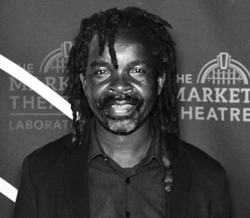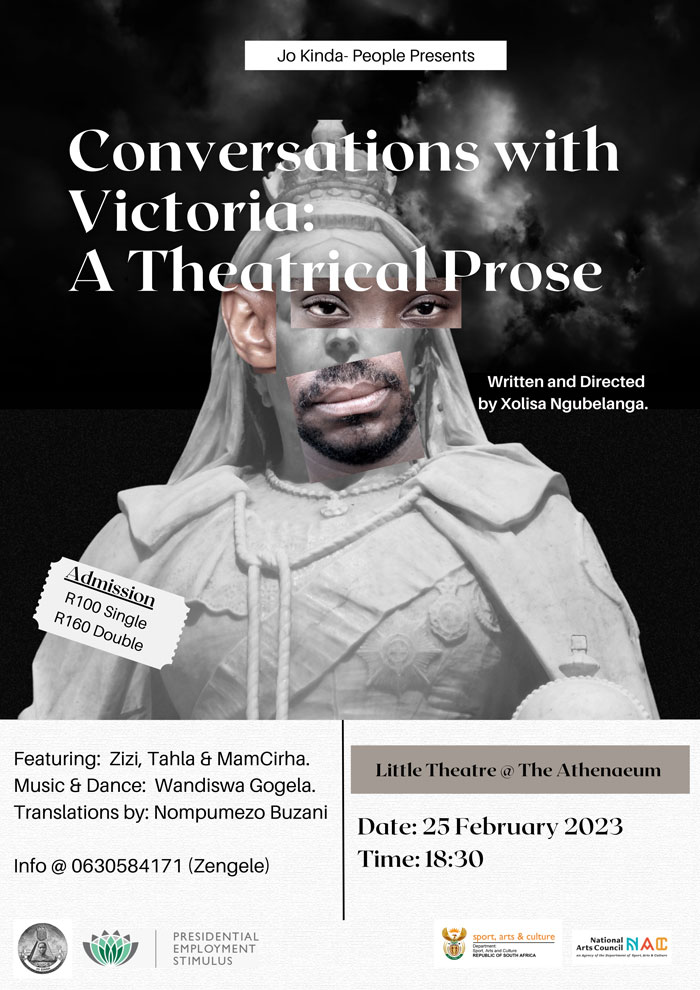A new play commemorating Black History poised to get tongues wagging over artistic representation of historical and political figures
By Edward Tsumele, CITYLIFE/ARTS Editor

The issue of who gets to be commemorated by whom and in which way and for what will always be contentious in any society. This is especially in a country whose history is as complicated as that of South Africa. Having been once upon a time visited by both colonialism and apartheid that divided the country mainly on racial grounds, issues of commemorating historical figures in South Africa will remain controversial for as long as people remember the history of where we come from.
Now there is a new play that is set to debut on the stages of a theatre in Gqeberha, Eastern, Capoe on February 25, 2023. Conversation with Victoria celebrates Black History month, which falls in the month of February and is celebrated internationally by people of colour. The celebrations though rooted in the history of the subduing of black Africans through slavery, is not at issue here. Certainly not as far as the upcoming theatrical production called Conversation with Victoria is concerned. Of course the staging of Conversation with Victoria is sure to cause political temperature to rise. Even cause discomfort in some quarters. The bigger issue here however is how symbols of commemoration of historical, often political events and figures are conceptualised, funded and commissioned and for whose benefit, that often causes controversy in society.
Granted, this play is about the relevance of a symbol of colonialism proudly taking a prominent public space in modern day South Africa. I mean Queen Victoria, if representative of Empire. Now we all know what has been done on the conjtinent in the name of the Empire during the colonial period. Colonialism has long been banned into the dust bin of history. Or is that so when we still have the figure of the Queen very much present in in face in this beautiful city of Gqeberha?
That itself is a source of much discourse in bars, academic halls and coffee shops as people try to come to terms with the living reality of our times in post-Apartheid South Africa. As the country tries so hard to shake off the past, such as colonialism and Apartheid in order to move forward, the presence of the past is very much part of everyday lived experiences of the people. It is as If the ghosts of the past do not want to let go of those they have haunted for so long. It is as If the ghosts of the past want to remind the current generation that their fate is very much tied to that of the ghosts. The sins of the ghosts’ ancestors as well as their actions on their victims are very much present in today’s realities. They are a haunting reminder of a dark past that previous generations suffered.
Yes it is these issues that those who will be lucky enough to attend and watch this play will grapple with in the city hall, just as the statue of Queen Victoria will be waiting to greet them as they file out of the theatre auditorium on that day.

But beyond and outside this theatre auditorium, a different but related debate will continue to rage in coffee shops, academic halls and bars. It is the issue of symbols to accommodate the acts of historical figures and events that shaped the history of this country as well as calibrate a path that has resulted in the current form of contemporary society.
In other words, who decides which events are commemorated and how, serving whose interest and whose money is used to create such symbols? Anyway, who gets to create the symbols and why and how? These are difficult questions that always crop up when artists are commissioned to create these symbols through sculptural works representing historical and political figures. And there is no universality in agreement. For example, who among the several characters that have played a role in the shaping of South Africa gets to be commemorated through a physical artistic form such as a sculpture representing their figure that gets displayed in public spaces?
For example, should it be liberation figures such as Nelson Mandela, Bishop Tutu, and not those associated with a not so glorious past, such as Paul Kruger, Jan Smuts and the lot? This is because someone’s villain is in fact someone’s hero as history tells us. This debate has no end in sight and it should not because in fact today’s hero could easily be a villain in the eyes of a few generations down the line. Especially when the politics of the country have taken a different form and complexion. That is the nature of society. It keeps on evolving. Two steps forward and three steps backwards. Sometimes. Unfortunately.
Now those who are looking forward to attending the Conversation with Victoria play on February 25, 2023, must perhaps bear the following current context in mind: Internationally the month of February is recognized as Black History Month where many progressive institutions and cities take time to reflect on their impact and attitudes towards black people they interact with. In this month in particular and through the height of Black Lives Matter cities and institutions worldwide were made to stop and reflect on the space they provide for black inhabitants, advise the producers of this play.
“During this time, we saw mostly colonial monuments and racist plaques being removed from many esteemed places. To be fair the debate of colonial monuments hording space in the modern world has always been an issue. With the most prolific locally being the Rhodes Must Fall Movement at the University of Cape Town which resulted in the removal of the Cecil Rhodes bask at its lawns.
In Gqeberha, Queen Victoria’s statue in front the main library was defaced in 2011 prompting a municipal debate among heritage enthusiasts about the significance of colonial monuments and names in the city. This debate was swift yet the artefacts that it inspired remain, one of such artefacts is a prose poem written by Xolisa Ngubelanga titled Conversations with Victoria.
Conversations with Victoria is a theatrical prose in isiXhosa and English with the synopsis: In post- colonial Africa youths carry the duty of restoring the African image and often find themselves being criminalized when they rage or speak against colonial land marks that remind them of a crude history.
Conversations with Victoria, holds an axe on the neck of colonial statues as an African King rises from the dead to find a land he once ruled polluted with monuments of foreign origin.
In February 2023 Gqeberha can once again view the statue of Queen Victoria almost a decade after it was sealed off due to construction at the main library and hopefully pick up the debate on decolonizing the city centre. This is a perfectly timed moment as this colonial statue is reintroduced back to the city in the middle of Black History Month. This is also the time when Xolisa Ngubelanga and Fikile Mahola with their dance and theatre colleagues are preparing to host a showcase of Conversations with Victoria at The Athenaeum on 25 February 2023.” A statement from the producers of the show reads.
Tickets are R100 single and R160 double. More information is available from Zengele on 0630584171.










